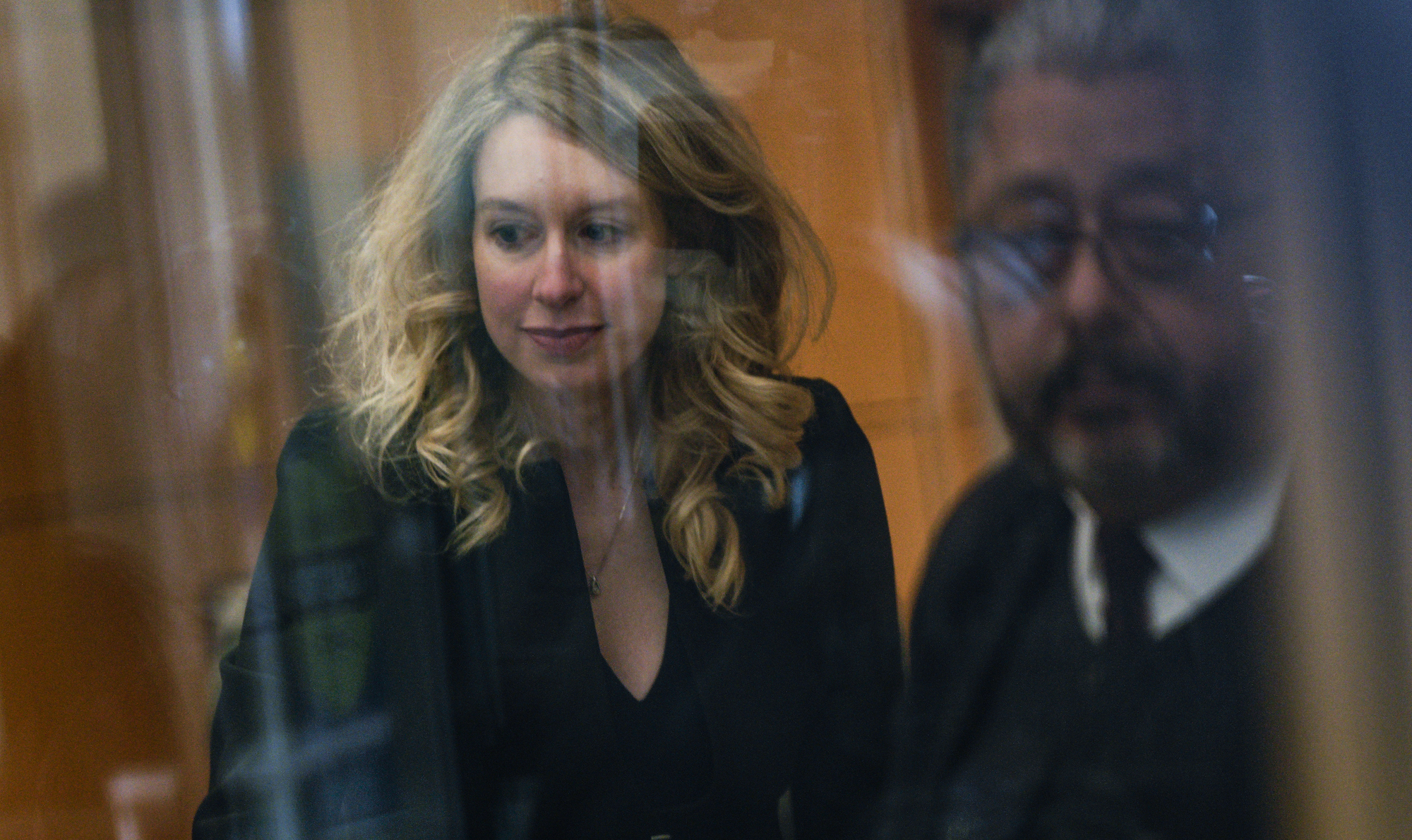People tend to care about their kids. I do not think that is a controversial observation. Moreover as a general sort of thing, people tend to appreciate and/or fear the social stigma against appearing not to care about one's own kids; even among very bad and cruel parents, many will endeavor to appear loving and caring toward their children when lots and lots of other people are watching. The revelation that a reviled notorious fraud appears, to a reporter spending time with them for a profile piece, a devoted parent humanizes the reviled notorious fraud precisely not at all.
Likewise: Sort of by definition, people tend to love the people that they, uh, fall in love with. That tends to be someone they want to be around, and in whose company they are happy. That seems pretty straightforward to me. Loving tenderness toward their romantic partner does not complicate the story of someone known to have done monstrous things to far-away faceless people; even a shit-eating rat likes things that make it feel good.
Covering all the bases, here, I'll go ahead and point out that people tend to want new acquaintances to like or at least not-dislike them; all the more so when that new acquaintance, a reporter for the most prominent print publication in the anglophone world, represents the close attention of millions or tens of millions of other people. While we are at it, people tend not to want their beloved pets to be eaten by mountain lions. People generally tend not to want to go to prison, if the alternative is being wealthy and free. When you observe that these general human truths apply to a famous public villain, you have discovered neither depth nor dimension in them. You have discovered nothing.
In a pinch, "identifying and homing in on the details that complicate a public figure's one- or two-dimensional image" is a pretty decent and succinct description of a profile writer's job. The first part of this job, then, seems like it should be making sure you know precisely what that image is to begin with: After all, it would not have added dimension to, say, Fred Rogers's image for a profile writer to be like, "Which is the real Fred Rogers? The guy on TV, or the genial tolerant sweetheart who likes to wear cardigans?" You need clarity on what the public figure's whole deal is before you can add ambiguity to it, especially in the case of controversial or infamous characters.
Which brings us to Elizabeth Holmes, disgraced and infamous founder of Theranos, the notoriously fraudulent blood-testing startup brought to ruin by the reporting of the Wall Street Journal's John Carreyrou. The New York Times published a big profile of Holmes over the weekend, by the writer Amy Chozick, who spent time with Holmes and her family last month, prior to the start of Holmes's 11-year prison sentence for various and sundry fraud. The profile strains for a kind of angsty wobbliness, a performative uncertainty over which exactly is the real Elizabeth Holmes: the turtlenecked Silicon Valley weirdo with the bizarre fake-sounding deep voice, or the normal-voiced mom who takes care of her babies and makes gestures of kindness toward the reporter hanging out with her for the express purpose of writing a story about what she's like. Here is a representative sample:
If you hate Elizabeth Holmes, you probably think her feigned perma-hoarseness was part of an elaborate scheme to defraud investors. If you are a person who is sympathetic to Ms. Holmes, then the James Earl Jones inflection was a sign of the impossible gymnastics that female founders must perform to be taken seriously. If you spend time with Ms. Holmes, as I did, then you might come away like me, and think that, as with many things about Elizabeth Holmes, it was both. Either way, even Mr. Evans agrees, the voice was real weird.
Here is another:
I realized that I was essentially writing a story about two different people. There was Elizabeth, celebrated in the media as a rock-star inventor whose brilliance dazzled illustrious rich men, and whose criminal trial captivated the world. Then there is “Liz,” (as Mr. Evans and her friends call her), the mom of two who, for the past year, has been volunteering for a rape crisis hotline. Who can’t stomach R-rated movies and who rushed after me one afternoon with a paper towel to wipe a mix of sand and her dog’s slobber off my shoe.
Either a sincere misapprehension or an intentional misdirection is at work here. The former would be cataclysmically embarrassing for Chozick and her editors at the Times, and yet still preferable, because the latter would be reprehensible. In either case it concerns what, exactly, Elizabeth Holmes's whole deal is—what she's infamous for; the only reason anybody knows her name; what made her scam stand out from innumerable others in a tech economy driven pretty much entirely by the creation and timely unloading of scams—and thus what, precisely, might be missing from anybody's incomplete understanding of her. Hint: It isn't that her voice was fake.
Everybody knew that. How in the hell could they not.
But her deal is also not, or not only, that she defrauded a bunch of rich investors. After all, venture-capital morons get soaked all the time—again, that is pretty much the explicit premise of America's entire tech economy—and few if any of this dark art's practitioners attain Holmes's level of infamy. Chozick's piece grapples, or pretends to, with the question of what else might explain it: Is it because she is a woman who dared to be proudly ambitious in a man's world?
Ms. Holmes’s defenders, stretching back to childhood, said in letters to the court, and in conversations with me, that the feverish coverage of Ms. Holmes’s downfall felt like a witch trial, less rooted in what actually happened at Theranos, and more of a message to ambitious women everywhere. Don’t girl boss too close to the sun, or this could happen to you …
Is it because she sought fame?
Ms. Holmes said she believed that making herself the poster girl for women in tech put a huge target on her back. She regrets being the subject of fawning magazine covers (though I imagine the authors of those stories regret it more). “I never lost sight of the mission but I think I did of the narrative,” she said. “The story became this story that was totally snowballed away from what we were actually talking about.”
What dodges any serious examination as a possibility here is that anything specific to Theranos's business might explain it. It's a sleazy trick, or anyway reads like one. Chozick draws a neat line around the crimes for which Holmes was actually convicted—"Ms. Holmes was not convicted on any counts related to patients"—and moves on: Here we have somebody convicted of defrauding investors, a thing that happens all the time. The unusual part, then, is how famous it made her, the unique heat and volume of scorn directed her way. And her personal qualities—weird voice, black turtleneck, being a woman CEO in tech—are what must explain it.
But! But. Laboratory blood-testing is not like other areas of tech startup endeavor or fraud. For one thing, unlike, say, a cockamamie coworking-space scheme or an app for disrupting food delivery or whatever, medical technology is one of the few industries in America regulated relatively tightly. This is no small part of what led to Theranos's exposure in the first place: Its claims and products could not ultimately escape the scrutiny of actual experts. But more importantly, unlike those other fields, laboratory blood-testing has stakes that go far beyond P&L statements.
To wit: In 2007 Holmes, knowing full well that Theranos's technology could not make good on her claims, arranged a 15-month study in which Theranos blood tests would be used to determine how late-stage cancer patients were responding to treatment. An inaccurate blood-test result in such an instance could give a terminal patient false hope for remission; more catastrophically, it could convince another of the ineffectiveness of a treatment that might be saving their life. In a walk-in clinic setting, an inaccurate blood-test result could persuade a patient to stop taking blood-pressure medicine, or make someone believe their first-trimester pregnancy had miscarried. The point here is blood-testing technology is not some indifferent area within which to make false claims.
Holmes's lies would have killed medical patients and/or irreversibly altered their lives, had she not been found out. She knew this, while she was telling those lies. After all, she wasn't caught lying about, for example, her company's profitability, as has led to the downfall of several other tech-industry frauds; her lies—to doctors and patients and the media and everyone else—were about what the Edison machine could do, and whether it could be trusted to do actual live blood-testing in public clinical settings.
So it's kind of incredible to read a reporter wringing their hands—even if only as a theatrical performance of Grappling With The Unknowability Of Others—over the question of whether or not you can really trust the weird-voice lady who says she's all better now. I don't care!
That Holmes was busted, charged with, and convicted of defrauding investors is a fluke of timing and happenstance and probably some amount of prosecutorial expediency, like Al Capone going to prison for tax evasion as a stand-in for all the many dozens of more serious crimes he committed and commissioned. To no small degree, she got lucky: Carreyrou unraveled her shit before it could kill anybody. But make no mistake, the more outrageous of her offenses isn't that she tricked some rich people into wasting some of their money. It's that she put innocent people's whole entire lives at stake, knowingly and repeatedly, to keep the money flowing. Who gives a fuck if she's nice to her dog.






